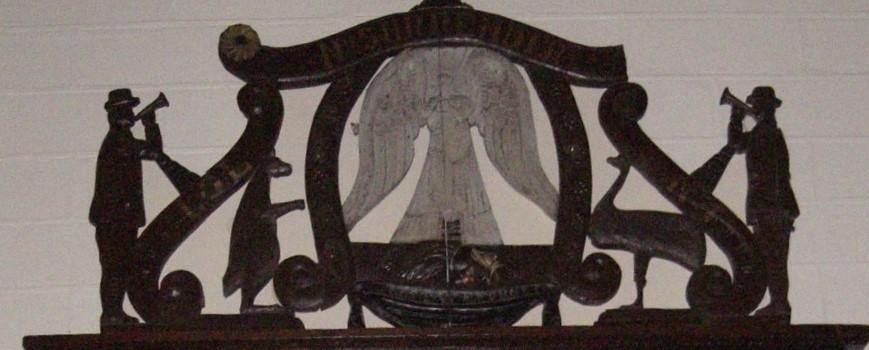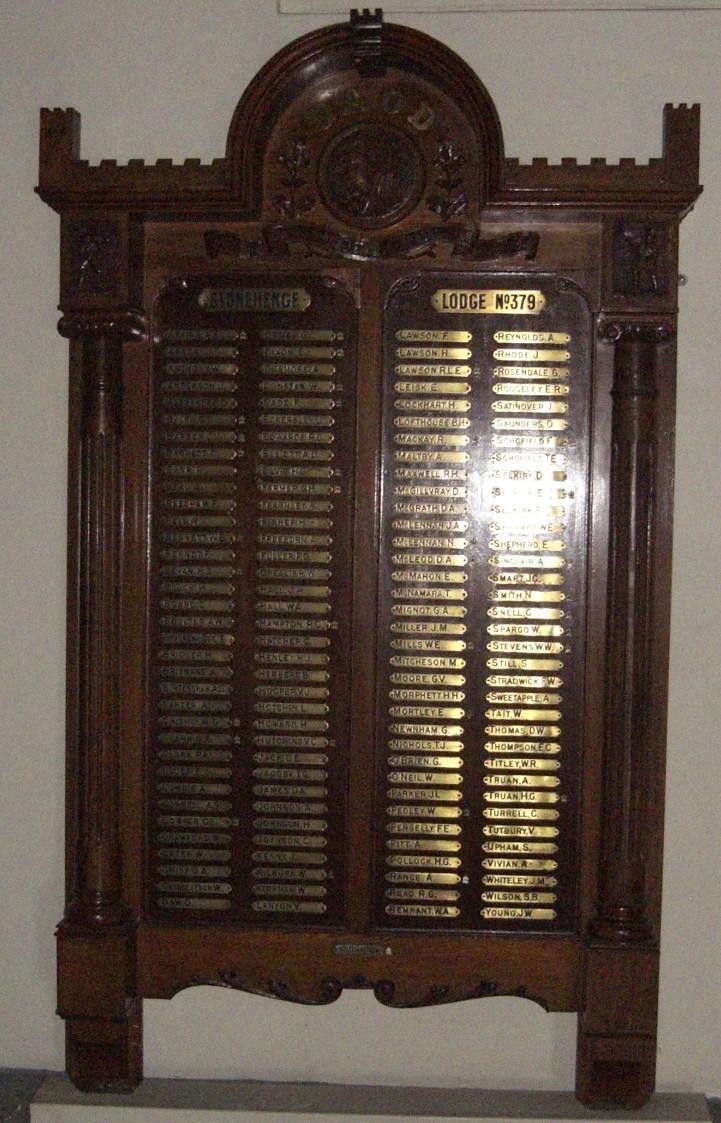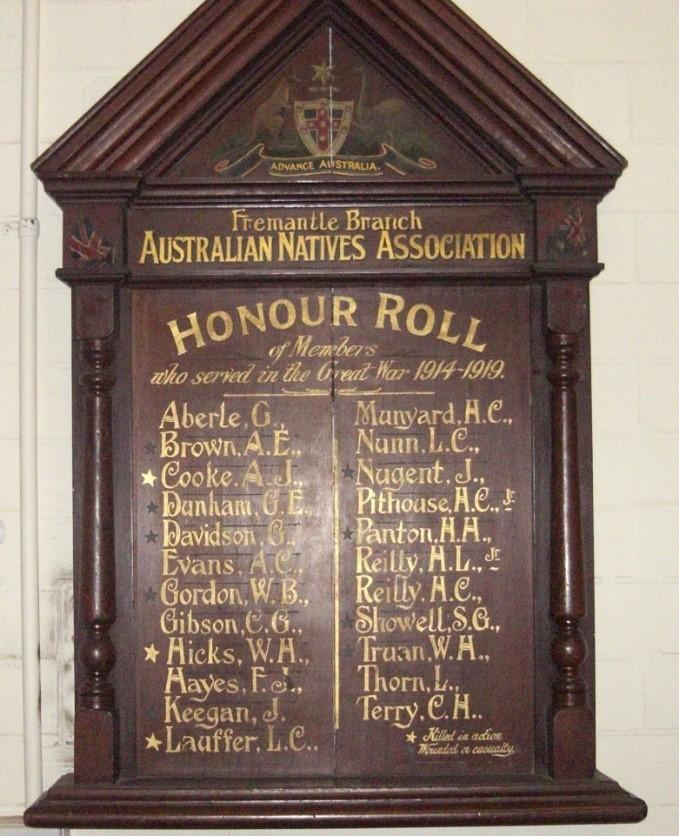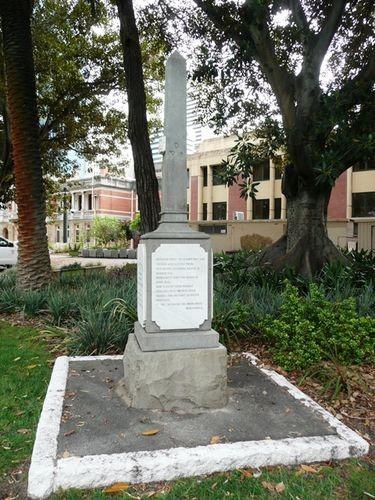World War 1 Lodge Honour Boards
LODGE, FRATERNITY AND FRIENDLY SOCIETY HONOUR BOARDS
Fraternities or lodges were an important part of Australian society in the 19th and the first half of the 20th century. After World War 2, they were gradually replaced by "service clubs", such as Lions, Apex and Rotary. By the end of the 20th century, most fraternities had been wound up except for the Freemasons and a few lodges of the Buffaloes. Friendly Societies, benevolent fraternal organizations, based around local lodges for the purpose of providing altruistic social and charitable services also fall within this category.
Many fraternities also offered insurance to their members and as membership declined, these operations were either combined with other non-profit insurance companies or sold with the proceeds being distributed to charitable causes. The Australian Army Museum of Western Australia retains an echo of the spirit of these passed entities through several Honour Boards in its collection. Ranging from wall size to modest tablets, these Honour Boards record the service of Lodge members who extended their values of fraternity and comradeship to military service and sacrifice in times of Australian peril.
The Loyal Orange Institution, commonly known as the Orange Order, is an international Protestant fraternal order based in Northern Ireland. The Orange Order was founded in County Armagh in 1795, during a period of Protestant–Catholic sectarian conflict, as a Masonic-style fraternity sworn to maintain the Protestant Ascendancy. It arrived in Australia through military Lodges in the 1830s and by mid-century had spread across the country as one aspect of sectarian division in Australia.
The 1916 date on the large Honour Board (previous page) of the Loyal Orange Institution is a reference not Irish loyalty following the Easter Rising in Dublin but the record of 36 (Ulster) Division at the Battle of the Somme. One of the few formations to achieve its opening day objectives, the Division suffered 5,500 casualties, killed, wounded, or missing. Four of the nine Victoria Crosses awarded in the first days of the battle were awarded to 36 Division soldiers.
The smaller Honour Board of the No 37 “No Surrender” Lodge depicts the death of nurse Edith Cavel below an angel in a setting of diggers in slouch hats, a kangaroo and an emu. Nurse Cavell was executed In Brussels by a German firing squad on 12 October 1915 for “war treason” for her role in assisting the escape of Allied soldiers to neutral Holland.
https://www.iwm.org.uk/history/who-was-edith-cavell
Non-partisan and non-sectarian, the Australian Natives’ Association (ANA) was established as a friendly society for Australian-born men providing sickness, medical and funeral cover. By 1910 it had developed into a nationwide association with real political and social influence.
The ANA lobbied strongly for the political union of Australia’s colonies at the time of Federation. It sought to shape Australia’s nationhood and identity and was a training ground for many politicians. By 2007, only the Western Australian Chapter remained and it was in the process of winding down.
https://slwa.wa.gov.au/pdf/mn/mn1501_2000/mn1647ANA.pdf
https://www.outbackfamilyhistoryblog.com/australian-natives-associations-hall/
The United Ancient Order of Druids resulted from a split in 1833 of the Ancient Order of Druids when members decided to create a druidic order more open to different social classes, structured as a benefit society and registered by government. The UAOD proved to be a great success and many of its members travelling abroad creating new lodges including Australia in 1851. By 1910, the UAOD had lodges across Western Australia including: Karrakatta, Westralia, Guildford, Northam, Golden West, Hawthorn, Balladong, Geraldton, Bunbury, Kalgoorlie, Kanowna, Leederville, Victoria Park, West Perth, Coventry, Beaconsfield, Bridgetown, Boulder, Collie, Mafeking, North Fremantle, Midland Junction, Maylands, Worsley, Boorara, Sandstone, Cue, Mount Magnet, Golden Mile, Brown Hill, Mornington, Meekatharra, Foster, Hoffmans, Narrogin, Holyoake, Dandalup, Dwellingup, and Pinjarrah.
During World War One, the dues of members serving were paid so that they could continue benefits including payments for sickness or death resulting from war service. Trove is replete with records of the UAOD before the war and their wartime fundraising, welcome of returned soldiers and unveiling of Honour Boards. UAOD Honour Boards contained similar design elements, but sizes varied as illustrated by the examples on display in the Artillery Shed at the Army Museum.
The Army Museum of Western Australia is currently in the process of re-photographing all Honour Boards in its stewardship and providing an digital summary of the recorded names. This will facilitate enhanced public access through the AWM web site Places of Honour and Collections WA.
The International Organisation of Good Templars (IOGT); founded as the Independent Order of Good Templars), was a fraternal organization which is part of the temperance movement, promoting abstinence from alcohol and other drugs. It was founded in the United States in 1851 and was established in Western Australia in the 1870s. Chapters were formed in Perth and many country towns. After World War 2 membership gradually decreased until the Order in Western Australia was wound up in 1965 and its assets passed to the WA Temperance Alliance. A small, dignified Memorial to Good Templars who fell during World War 1 and World War 2 stands in a quiet corner of the Supreme Court Gardens.
https://vwma.org.au/explore/memorials/3859
https://trove.nla.gov.au/newspaper/article/82891213?searchTerm=Templar
Visit the Australian Army Museum of Western Australia web site
Detail from No 37 “No Surrender” Lodge, Orange Order
Detail from Fremantle Branch, Australian Natives Association



